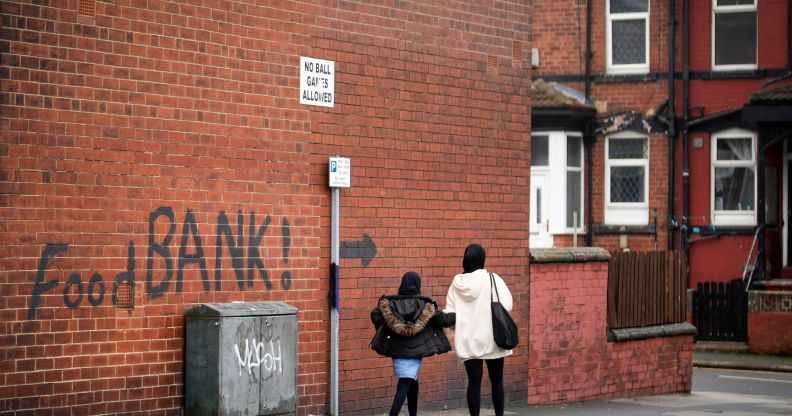New energy price hike could push more vulnerable people into poverty, experts warn

A mother and child can be seen walking past a food bank sign. (Getty)
The rise in the energy price cap risks putting even more vulnerable people over the poverty line, charities and advocacy groups have warned.
Energy regulator Ofgem announced on Thursday (23 November) that it is raising its price cap from £1,834 for a dual fuel household to £1,928 from 1 January 2024 due to the rising costs in the wholesale market.
“This is a difficult time for many people, and any increase in bills will be worrying,” Ofgem chief executive Jonathan Brearley said.
“But this rise – around the levels we saw in August – is a result of the wholesale cost of gas and electricity rising, which needs to be reflected in the price that we all pay.
“It is important that customers are supported and we have made clear to suppliers that we expect them to identify and offer help to those who are struggling with bills.”
‘Record numbers’ already attending food banks
Charities and advocacy organisations have already expressed concern about how the upcoming price hike could push even more people into poverty by preventing them from being able to afford essentials such as food, adequate housing, electricity and heating.
“We are currently experiencing record numbers of people on the lowest incomes coming to food banks as more and more people struggle to afford the essentials, including energy bills,” said Helen Barnard, director of policy and research at the Trussell Trust, a charity that works to end hunger and food poverty in the UK.

“With increased numbers of people faced with impossible decisions around prioritising heating or eating this winter, we forecast that food banks in the Trussell Trust network will provide one million emergency food parcels between December 2023 and February 2024 – the most ever for this period.
“This is not right. Any UK government has a moral duty to protect its citizens from severe hardship. That’s why we are calling on the UK government to embed an essentials guarantee into the social security system. This would mean that decisions about uprating benefits can be made based on evidence that reflects the realities of people’s lives, rather than having an annual debate shaped by the politics of the day.”
There are also concerns about how rising energy costs, and the ongoing cost-of-living crisis, is affecting children in the UK.
“Growing up in poverty means children are at risk of going cold and hungry,” said Lynn Perry MBE, chief executive at Barnardo’s.
“They are missing out on opportunities, and, as a result, their physical and mental health suffers – all of which can affect them long into adulthood.
“Yesterday’s Autumn Statement was a missed opportunity for the government to act now and prevent more children from growing up in poverty. We call on them to take immediate action, including extending the Household Support Fund beyond March 2024, scrapping the two-child benefit cap, and introducing an essentials guarantee.”
The news comes just weeks after the Joseph Rowntree Foundation (JRF) warned that 3.8 million people faced destitution – which is regarded as the most extreme form of poverty – in 2022, representing a 61 per cent increase from 2019.
The charity estimates that a million of those who faced destitution – which is defined as being unable to stay warm, dry, clean and fed – were children.
“Across our country we are leaving families freezing in their homes or lacking basic necessities like food and clothing,” said Paul Kissack, chief executive at the JRF.
“Such severe hardship should have no place in the UK today – and the British public will not stand for destitution on this scale.
“The government is not helpless to act: it is choosing not to. Turning the tide on destitution is an urgent moral mission, which speaks to our basic humanity as a country, and we need political leadership for that mission. That is why we are calling for clear proposals from all political parties to address this challenge with the urgency it demands.”

